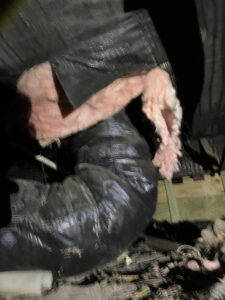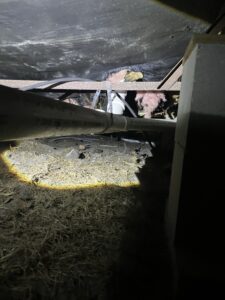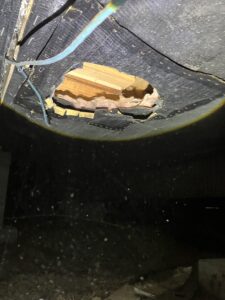Protect Your Home
Is Your Crawlspace a Rat Playground?
Rats can cause significant damage if they find a home in your crawlspace. Knowing the signs of an infestation is critical for quick action.
Signs of Rats in Crawlspace
Look for obvious indicators that rats have taken up residence. Each clue can lead to faster solutions.
Dangers of an Infestation
Pay attention to what you find. Ignoring these signs could lead to bigger problems.
How Do Rats Get into Crawlspace
Crawlspaces can be ideal spaces for rats to live. It offers the perfect combination of everything a rat needs to survive, such as:
- Protection from predators
- Protect from the elements
- Ideal nesting spot
- Close to food and water
- East entry points
Why Are Rats in My Crawlspace
Rats are prey animals and survive by avoiding predators. They can squeeze through gaps the size of quarters. Crawlspaces provide a secluded, secure area accessible by rats but not predators, birds of prey, coyotes, or foxes. They also find protection from extreme weather like snow, cold, and heat.
Rats tend to stay close to their nests, and rats can easily access your kitchen and pantry. The security and proximity to food make crawlspaces an ideal nesting location for rats.
How Do Rats Get the Crawlspace
The most common ways rats get into the crawlspace are:
- Utility points like HVAC, electrical, and plumbing
- Construction gaps under the house
- Foundation vents
- Broken doors and windows
- Holes
Signs of a Rat Infestation Under the House
Common signs of a rat infestation under your house include:
- Holes dug around the foundation of your home.
- Capsule-shaped fecal droppings around the outside of a burrow or along their runways.
- A strong, musky odor caused by their frequent urination.
- Dark, greasy smear marks along your foundation.
- Tufts of fur caught on foundation plantings.
- Squeaking noises heard through your floorboards.
Damages Associated with a Rat Infestation in Crawlspace
Rats are some of the most destructive pests. The cause property damaging by ceaselessly gnawing on everything. Rats contaminate everywhere they scurry with feces and urine.
Other damages caused by rats:
- Contamination from feces
- Destruction of air ducts and vents
- Water damage associated with gnawed pipes
- Gnawed electrical wires can lead to power fluctuations and risk of house fires
Photos courtesy of Stuart, Trutech Wildlife Service in Jacksonville
Getting Rid of Rats Under the House
Most DIY rat control methods fall short for established rat infestations. When you have rats in the crawlspace, you usually notice when the infestation is well established. Rats breed rapidly and leave behind pheromone trails for other rats to follow. If you have found evidence of a rat infestation in the crawlspace, the most effective thing to do is call a rodent control professional.
Our four-step process will get rid of rats in the crawlspace. We will identify all the rat entry points and catalogue the damage done. Based on the inspection, we implement a custom rat-trapping process to exterminate the rats. Once the rat population is under control inside, we implement our exclusion tactics to keep rats out. Finally, we implement a restoration process that includes ectoparasite treatments, sanitation agents, and in some cases a crawlspace encapsulation.




